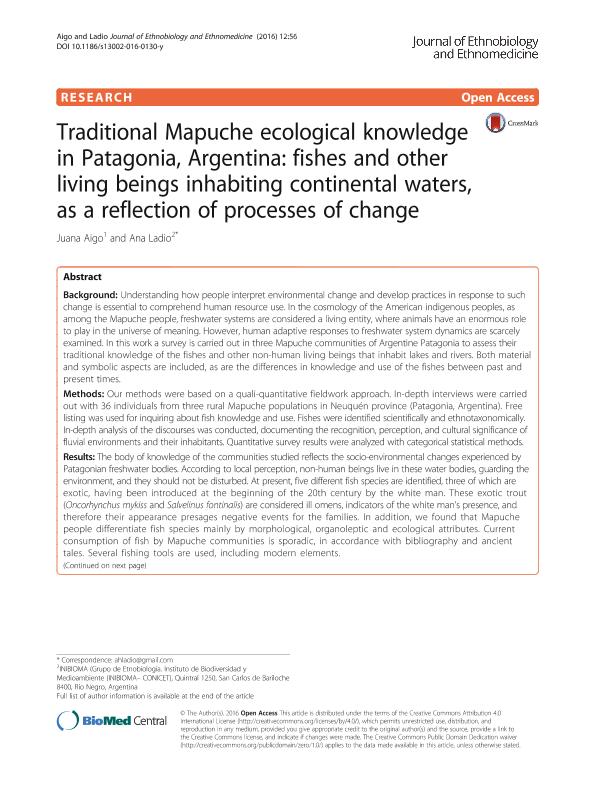Artículo
Traditional Mapuche ecological knowledge in Patagonia, Argentina: Fishes and other living beings inhabiting continental waters, as a reflection of processes of change
Fecha de publicación:
07/12/2016
Editorial:
BioMed Central
Revista:
Journal of Ethnobiology and Ethnomedicine
ISSN:
1746-4269
Idioma:
Inglés
Tipo de recurso:
Artículo publicado
Clasificación temática:
Resumen
Background: Understanding how people interpret environmental change and develop practices in response to such change is essential to comprehend human resource use. In the cosmology of the American indigenous peoples, as among the Mapuche people, freshwater systems are considered a living entity, where animals have an enormous role to play in the universe of meaning. However, human adaptive responses to freshwater system dynamics are scarcely examined. In this work a survey is carried out in three Mapuche communities of Argentine Patagonia to assess their traditional knowledge of the fishes and other non-human living beings that inhabit lakes and rivers. Both material and symbolic aspects are included, as are the differences in knowledge and use of the fishes between past and present times. Methods: Our methods were based on a quali-quantitative fieldwork approach. In-depth interviews were carried out with 36 individuals from three rural Mapuche populations in Neuquén province (Patagonia, Argentina). Free listing was used for inquiring about fish knowledge and use. Fishes were identified scientifically and ethnotaxonomically. In-depth analysis of the discourses was conducted, documenting the recognition, perception, and cultural significance of fluvial environments and their inhabitants. Quantitative survey results were analyzed with categorical statistical methods. Results: The body of knowledge of the communities studied reflects the socio-environmental changes experienced by Patagonian freshwater bodies. According to local perception, non-human beings live in these water bodies, guarding the environment, and they should not be disturbed. At present, five different fish species are identified, three of which are exotic, having been introduced at the beginning of the 20th century by the white man. These exotic trout (Oncorhynchus mykiss and Salvelinus fontinalis) are considered ill omens, indicators of the white man's presence, and therefore their appearance presages negative events for the families. In addition, we found that Mapuche people differentiate fish species mainly by morphological, organoleptic and ecological attributes. Current consumption of fish by Mapuche communities is sporadic, in accordance with bibliography and ancient tales. Several fishing tools are used, including modern elements. Conclusions: Our data enable us to characterise dynamic traditional knowledge in these communities, which is flexible in nature and adaptable to new situations, demonstrated by the incorporation not only of new species but also new fishing tools. It also seems that new significances become absorbed in synchrony with the advance or arrival of exotic and invasive species. For the Mapuche, the presence of the white man heralded by exotic trouts speaks of how a recent event, such as the introduction of the salmonids, is already incorporated into Mapuche symbolism. Mapuche traditional knowledge and cosmovision on the use of fish and waters, a vision which promotes respect and the avoidance of actions that could disturb the beings (animals and sacred or mythological characters) that inhabit and take care of them should be fostered as part of management plans of regional natural resources. This paper contributes to the broader literature on freshwater resource management by providing empirical evidence of the critical role of local perceptions in promoting the sustainable management of natural resources.
Palabras clave:
Ethnoichthyology
,
Fish
,
Fluvial Environments
,
Perception
Archivos asociados
Licencia
Identificadores
Colecciones
Articulos(INIBIOMA)
Articulos de INST. DE INVEST.EN BIODIVERSIDAD Y MEDIOAMBIENTE
Articulos de INST. DE INVEST.EN BIODIVERSIDAD Y MEDIOAMBIENTE
Citación
Aigo, Juana del Carmen; Ladio, Ana Haydee; Traditional Mapuche ecological knowledge in Patagonia, Argentina: Fishes and other living beings inhabiting continental waters, as a reflection of processes of change; BioMed Central; Journal of Ethnobiology and Ethnomedicine; 12; 7-12-2016; 1-17
Compartir
Altmétricas




